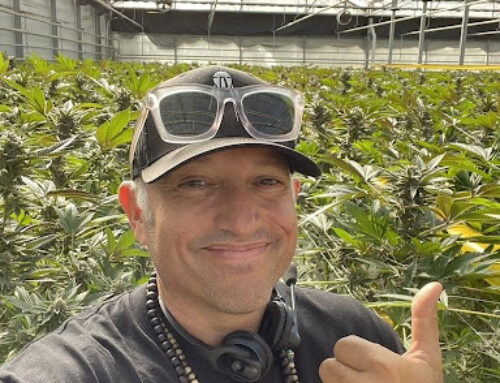Opinion: Cannabis PR Scares Me…and It Should Scare You Too–By Lauren Mundell
LOS ANGELES–First of all, if you don’t understand PR, you’re not alone. One of the top influencers in PR Parry Headrick often recycles this post and it gets hundreds of comments each time.

So, instead of speaking to other PR people in this article, I am going to take the approach of explaining what is going on in cannabis PR to my mom.
Let me start by acknowledging the crucial role PR agencies play in the cannabis industry. They are the vital bridge connecting companies to the media. However, we must examine potential challenges that arise when multiple powerful clients are represented by a single agency. I want to emphasize that my intention is not question professionalism. Rather, I aim to explore systemic concerns and their broader implications for the industry.
To topline it, here’s why the current state of cannabis PR should scare you:
- There are evil billionaires and toxic cultures in every industry. But in the cannabis industry a majority of the most powerful and well-funded companies are represented by one PR agency, MATTIO Communications.
- Each of those powerful clients make up the bulk of the advertising dollars to be spent on industry media and sponsorships.
- The one PR agency that represents all of these clients directly influences what makes it (and doesn’t make it) to the news.

Not many media companies really ”Follow The Money” in cannabis.
Now let’s go deeper.
Why should it scare you that a majority of the most-powerful and well-funded companies are represented by one PR agency?
Do you think Coke & Pepsi have the same agencies? Absolutely not. In fact, when I worked on Unilever business at Ogilvy, I was interviewing for a job at an agency to lead a P&G business and was told I was ineligible for the job because I was working for the competition.
A quick list of reasons why it’s dangerous for Trulieve, Green Thumb Industries (GTI), Ascend Cannabis Co and Curaleaf among many others to share the same PR agency.
- Collusion and anti-competitive behavior
- Limited transparency and accountability
- Loss of independent voices
- Vulnerability to reputation risks
- Lack of diversity in representation
Each of these on their own should be a good enough reason for you to agree with me that this puts the entire industry at risk. Collusion and anti-competitive behavior is pretty self explanatory.
But, let’s look at the second bullet above; when the most powerful cannabis companies share the same PR firm, there is a risk of limited transparency and accountability. This could result in a lack of independent oversight and objective reporting, potentially allowing unethical practices or controversies to go unnoticed or unaddressed. It is essential for the cannabis industry to maintain transparency and accountability to foster trust and credibility.
In the past few years, we have seen many negative stories get buried or receive minimal coverage. A worker died at a Trulieve facility in Massachusetts and it took 10 months for the story to be well-covered in the cannabis media.
Just this month workers were striking at Rise Dispensary in Chicagoland for more than 10 days, but the story didn’t receive any media coverage between the announcement of the pending strike and the settling of the deal. And, workers are reportedly currently striking at Ascend in Boston, but there is no media coverage of that dispute to date.
Finally, in October of 2022: “Three of four independent board members of Green Thumb Industries (OTC: GTBIF), including Dorri McWhorter, resigned over what the marijuana company said was “a disagreement as to the company’s policies and practices related to personal misconduct.”
This industry is chock full of personal misconduct. And, it’s the PR agency’s job to clean it up and keep it quiet.
Why should it scare you that each of those powerful clients make up the bulk of the advertising dollars to be spent on industry media and sponsorships?
- Monopolistic control over media narrative
- Suppression of competition
- Reduced consumer choice and variety
- Imbalanced representation and unequal market access
In the words of a deplorable leader from the past, “Without the loudspeaker, we never would have conquered Germany.” In our young industry, an all-powerful loudspeaker is being handed to leaders who have demonstrated their often less than ethical true colors. When a single PR agency manages the advertising & sponsorship dollars for major companies, it can exert monopolistic control over the media narrative, suppress competition, reduce consumer choice and variety, and create an imbalance in representation and market access.
But, very few people understand this which is why I am sharing my thoughts.

What is good for the cannabis industry?
Why should it scare you that the one PR agency that represents all of these clients directly influences what makes it (and doesn’t make it) to the news?
Going back to the assumption that most people reading this don’t understand PR, let me do a quick explanation. (see my video “What is PR?” here).
To understand this, let me provide a quick explanation of PR. Public Relations agencies, among other functions, build relationships between their clients and the news media. They facilitate storytelling by providing spokespeople, facts, and information to journalists, aiding in the creation of media content. When companies have positive news to share, PR agencies pitch it to the media. However, when companies face negative news, PR agencies, sometimes referred to as “spin doctors,” step in to mitigate its impact and keep the clients out of the spotlight.
There are numerous tactics employed to suppress news, and financial relationships between agencies and media outlets can delay investigative journalism. If all the competitors in the industry are managed by one agency, there is little incentive for competitors to pressure the media to cover negative news. This cozy arrangement can be concerning, as it limits the comprehensive reporting that the industry needs.
For example, Tuesday, journalist Dusty Christensen had to decline an interview with a cannabis-focused media outlet because 4 hours before the appearance he was told that he could not “name names” in terms of which cannabis companies his investigative journalism focused on. The company was Trulieve. Christensen’s journalism specifically calls out the big MSOs and you can see from the below that he felt going on and editing himself to protect those companies was something that “no self-respecting journalist would do.” “If you don’t want me to name names, whatever your reasons may be, I’m not the guest for the show today.” Of course, it’s only speculation that someone from Trulieve or their agency got wind of the interview and put pressure on the media outlet not to name names. But, why else would media not want to out companies (and get clicks) unless they were incentivized or coerced not to?

I believe it is crucial for the cannabis industry to hold itself to ethical standards, just like any other publicly traded sector. Consumers deserve accurate information, and the media plays a vital role in providing it. My aim with this piece is to raise awareness of the challenges emerging from the concentration of power within the industry. It’s important to understand that not all news is necessarily the whole truth, and being aware of the sources and their potential biases is paramount.
Definitely follow Mike Crawford for more info and Elizabeth Udell for the ongoing popping of the #MSOgang bubble.




































